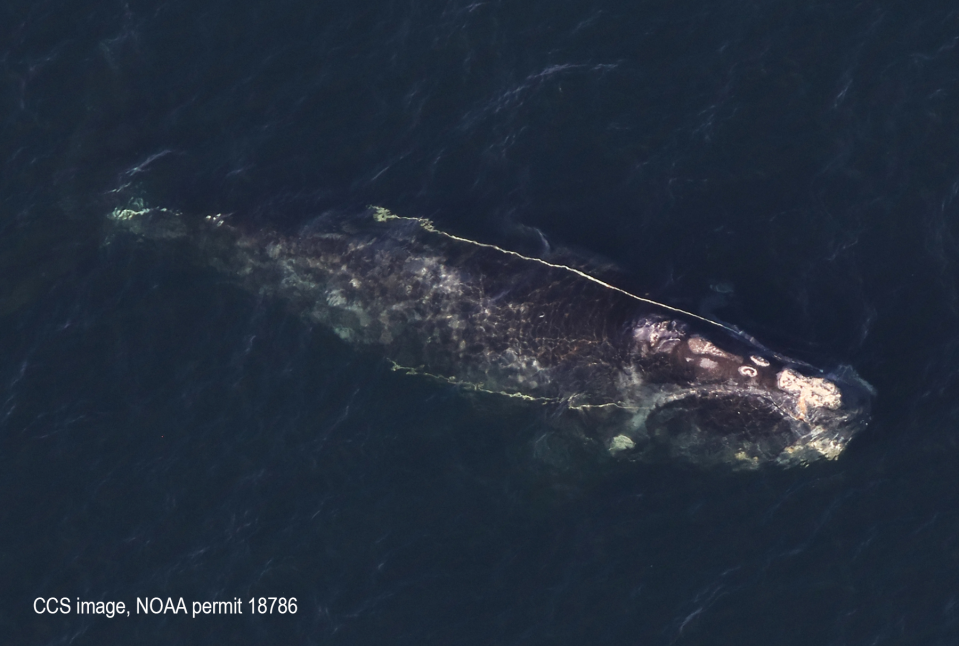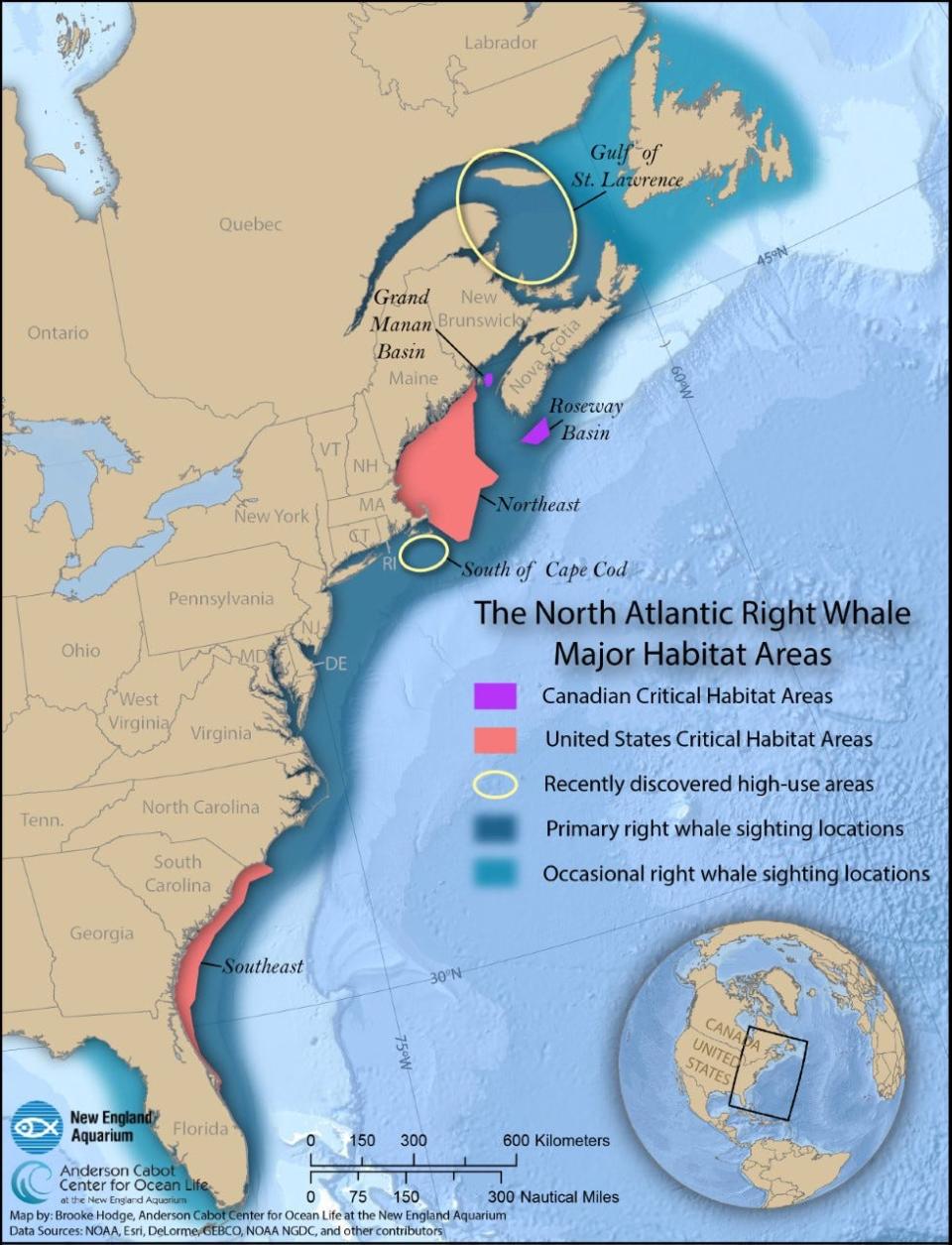Stormy seas delay response to help ailing right whale Snow Cone
In the week since chronically-entangled North Atlantic right whale Snow Cone was last seenabout 15 nautical miles south of Nantucket, dragging a new burden of fishing ropes on top of the remains of a previous entanglement, it's been a waiting game for those who would go to her aid.
Seas tossed up in the path of Hurricane Fiona, and now by Hurricane Ian, have made it impossible for members of the Marine Animal Entanglement Response Program out of the Center for Coastal Studies in Provincetown to mount a mission to help — sea conditions for entanglement attempts of any whale need to be relatively calm for the safety of responders, the scientists said. Otherwise, they'd have been at her side in a heartbeat.

But the bad weather hasn't stopped the team, led by entanglement director Scott Landry, from preparing.
"There's a lot of planning going on," said Amy Jenness, a spokesperson for the Center of Coastal Studies.
The team has been closely monitoring weather, and plans to head out in search of Snow Cone as soon as it is safe.
It is not known how far the free-swimming 17-year-old, who weighs approximately 50 tons, may have traveled since she was spotted on Sept. 21 by the New England Aquarium aerial survey team. The team raised the alarm when they noticed the already-ailing whale was dragging new entanglement picked up since her previous sighting this summer in the Gulf of St. Lawrence.
Jenness said locating Snow Cone will be a challenge.
"The size of the area they need to cover is the size of Connecticut," she said.
Right whales are slow swimmers, but Snow Cone was swimming at a slower rate than normal
Right whales are slow swimmers. In good health, they may swim at a rate of six miles per hour, but they do pause to rest. When she was seen Sept. 21, the New England Aquarium scientists noted Snow Cone was swimming at a noticeably slower rate than she would if she was well. A proliferation of orange cyamids, or whale lice, was proof of this — while it is not unusual for the whales to have some of these crustaceans on them, feeding off algae and dead skin on their bodies, a large number of lice indicates the animal has been swimming more slowly than is normal.
PREVIOUSLY REPORTED: A whale and species on the brink. The end may be near for chronically entangled Snow Cone
“She was moving so slowly, she couldn’t dive, she just sunk. She’s suffering,” noted New England Aquarium research assistant Sharon Hsu said in a release issued by the aquarium. Hsu was with the aerial team when the team members spotted Snow Cone last week.
Scientists who have been keeping tabs on Snow Cone, who is listed as whale #3560 in the New England Aquarium right whale catalog, fear she may be dying. But Landry said last week nobody is throwing in the towel yet. As long as Snow Cone is still breathing, there is always hope.
"In the work that we do we have to rely on optimism and hope," he said last Friday. "We've never given up on a whale. We definitely think it's worth our while to try to intervene and save her."
More: WHOI scientist wrote a book on right whales’ possible extinction. Why you should know him.
More: Critics say NOAA plan not enough to save critically endangered right whales
If they are able to locate Snow Cone once the stormy seas subside, Landry's team will attempt to unravel her from her latest entanglement. But even if they are successful, she will still have to live with older rope from her previous entanglement that responders have not been able to remove — rope wrapped around her upper jaw that has become embedded in her skin and has seriously impacted her health.

The latest entanglement is at least her fifth. Landry said multiple entanglements are not unusual for right whales, and the majority of the whales living today have experienced at least one entanglement. Disentangling the massive animals is dangerous work, as the responders must deal with animals that are often frightened and hurting, and will act to protect themselves.
To put the size of an average right whale into focus, individuals may weigh about the same as eight adult African elephants — the largest land mammal. They have power akin to a Mack truck, Landry said.
Entanglement in fishing rope is leading threat to North Atlantic right whales, according to researchers
Entanglement is one of the leading threats for the critically endangered right whales, which exist on the brink of extinction. Strikes by ocean-going vessels is the other leading cause of serious injury and death for the mammals. Scientists estimate there are only about 336 left.
Snow Cone is presently following her instinct toward the southern range of her habitat hundreds of miles away, off the coast of Georgia. The warmer waters off Georgia and Florida are the only calving grounds for the whales.
Since 1984, the Center for Coastal Studies has freed more than 200 large whales and other marine animals from life threatening entanglements using techniques developed by center staff, the organization said.
The center is federally authorized to perform large whale disentanglement under the authority of a permit issued by the National Marine Fisheries Services.
To report any live or dead marine animal entanglements, call 1-800-900-3622 or hail the U. S. Coast Guard on VHF 16.
Get the Cape Cod news that matters delivered to your inbox. Sign up for our free newsletters.
This article originally appeared on Cape Cod Times: Stormy seas delaying response to help ailing right whale Snow Cone

